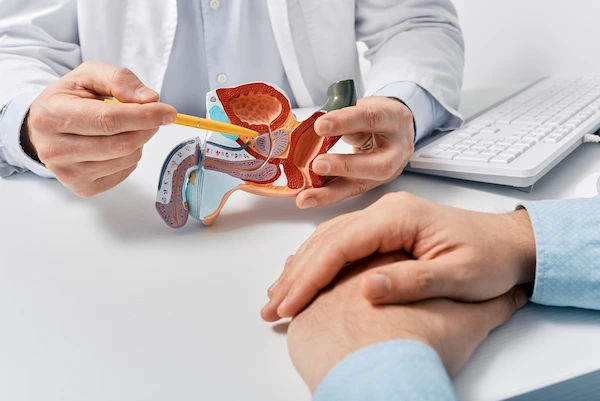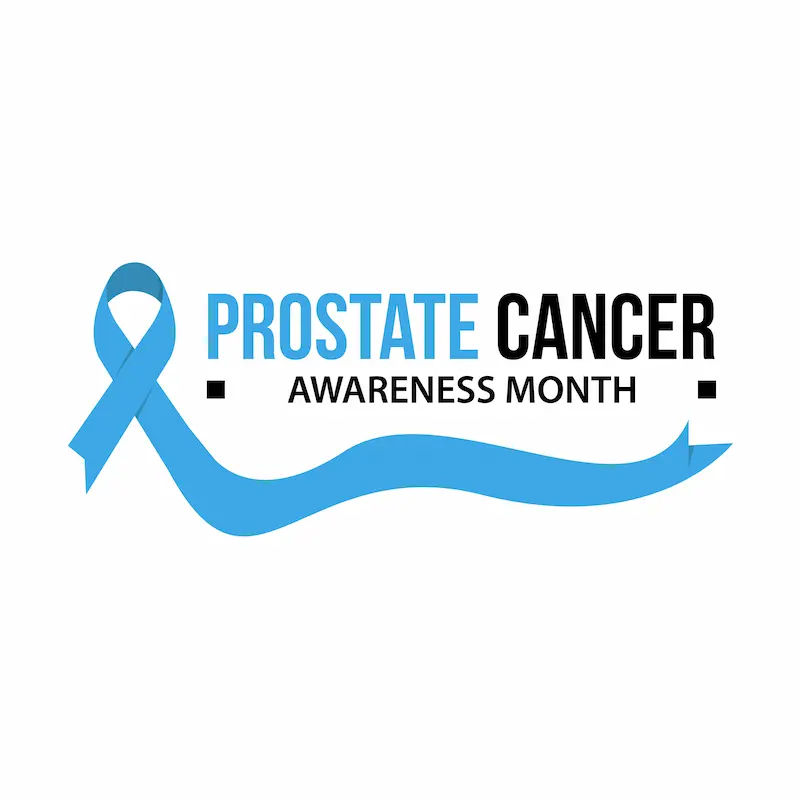What Leads To Prostate Cancer
Learn about the key risk factors for prostate cancer, including age, genetics, lifestyle, and other factors that can impact your risk.

Written by Dr. Rohinipriyanka Pondugula
Reviewed by Dr. M L Ezhilarasan MBBS
Last updated on 13th Jan, 2026

Introduction
Prostate cancer is one of the most common cancers affecting men worldwide. If you or a loved one are concerned about it, you’ve likely asked the fundamental question: what actually leads to prostate cancer? The answer isn't simple, as it's a complex disease with no single cause. Instead, it's the result of a combination of factors, some inherent and unchangeable, others influenced by our daily choices. Understanding these risk factors is the first powerful step toward proactive health management. This article will demystify the leading causes and contributors to prostate cancer, separating myth from fact. We'll delve into the roles of age, genetics, and race, and then explore the significant impact of lifestyle factors like diet, weight, and smoking. We’ll also look at the emerging science behind inflammation and hormones. Our goal is to provide you with a clear, comprehensive guide so you can have informed conversations with your doctor and make decisions that support your long-term well-being. If you have specific concerns based on your family history or symptoms, consulting a doctor online with Apollo24|7 can provide personalised guidance.
Unchangeable Risk Factors: What You Can't Control
Certain risk factors for prostate cancer are fixed. While you can't change them, knowing about them helps you understand your personal risk level and be more vigilant about screening.
The Primary Driver: Advancing Age
Age is, by far, the strongest risk factor for prostate cancer. The disease is exceptionally rare in men under 40, but the risk increases dramatically after age 50. Approximately 60% of all prostate cancers are diagnosed in men over 65. The reason is cumulative: as men age, their cells undergo more divisions, and with each division, there's a tiny chance for a genetic error (mutation) to occur. Over decades, these mutations can accumulate, eventually leading to uncontrolled cell growth and cancer.
Genetics and Family History: The Inherited Link
Your family history plays a significant role. If your father or brother has had prostate cancer, your risk is more than doubled. The risk is even higher if multiple relatives were diagnosed, especially at a young age. This points to inherited gene mutations. For example, mutations in the BRCA1 and BRCA2 genes, well-known for increasing breast and ovarian cancer risk in women, also raise the risk of aggressive prostate cancer in men. This is a key area where understanding your family history of prostate cancer is crucial.
Race and Ethnicity: Understanding the Disparities
Statistics show stark disparities. African American men have the highest incidence rate of prostate cancer in the world;
they are about 70% more likely to develop it than white men and are more than twice as likely to die from the disease. The reasons are complex and likely involve a combination of socioeconomic factors (like access to healthcare) and biological factors (including potential genetic predispositions). The increased risk for African American men means earlier and more frequent screening discussions with a doctor are often recommended.
Consult a Urologist for the best advice
Lifestyle and Environmental Influences: Factors You Can Modify
This category offers the most opportunity for empowerment. While not guaranteed prevention, healthy choices can significantly influence your risk profile.
The Weighty Issue: Obesity and Prostate Cancer
Research consistently links obesity to an increased risk of developing an aggressive form of prostate cancer. While the connection isn't perfectly straightforward for low-grade cancer, for advanced disease, the link is clear.
How Body Fat Influences Cancer Growth
Body fat, particularly visceral fat, is not inert; it's metabolically active. It produces hormones and proteins that create a state of chronic inflammation throughout the body. Excess fat can also alter levels of key hormones like insulin and testosterone, creating an environment that may fuel cancer cell growth. For obese men, prostate cancer is often detected at a later, more advanced stage, possibly because a larger prostate can make a PSA test less reliable.
Dietary Choices: The Fuel for Your Health
The link between diet and prostate cancer is a major area of research. The overall pattern of eating appears more important than any single "superfood."
The Red Meat and Dairy Debate
Diets high in red meat (beef, pork, lamb) and high-fat dairy products have been associated with a modestly increased risk. The proposed mechanisms include saturated fats, carcinogens formed when meat is cooked at high temperatures (like grilling), and the influence of certain growth factors present in dairy. This doesn't mean you must eliminate them, but moderation is key.
The Protective Power of a Plant-Based Diet
Conversely, diets rich in fruits, vegetables, and legumes seem to have a protective effect. Tomatoes (cooked, for lycopene), cruciferous vegetables (broccoli, cauliflower), soy, and foods high in healthy fats like omega-3s (found in fish) are all being studied for their potential cancer-fighting properties. These foods are packed with antioxidants and anti-inflammatory compounds that help protect cells from damage.
Smoking and Chemical Exposure
Smoking is a well-established carcinogen for many cancers, and prostate cancer is no exception. Long-term smokers have a higher risk of dying from prostate cancer. Exposure to certain chemicals, such as Agent Orange, has also been linked to an increased risk. Quitting smoking is one of the most impactful health decisions a man can make.
The Role of Inflammation and Hormones
Inflammation and hormonal changes can significantly impact your health over time.
Prostatitis: Could Chronic Inflammation Be a Trigger?
Prostatitis, or inflammation of the prostate, is a common condition. Some studies suggest that chronic inflammation may play a role in the development of prostate cancer. The theory is that repeated cycles of cellular damage and repair during inflammation can increase the chance of genetic mutations. While not all prostatitis leads to cancer, it’s an area of active investigation.
Testosterone and Other Hormonal Factors
Since prostate cancer cells are often driven by androgens (male hormones like testosterone), there has long been interest
in the role of hormone levels. Interestingly, high testosterone levels have not been conclusively proven to cause prostate cancer. However, treatments for advanced prostate cancer often focus on reducing androgen levels to slow cancer growth, indicating their crucial role in fueling the disease once it exists.
Proactive Steps: Can Prostate Cancer Be Prevented?
There is no surefire way to prevent prostate cancer, but you can certainly reduce your risk. Focus on the factors within your control:
- Maintain a Healthy Weight: Aim for a BMI under 30 through diet and exercise.
- Adopt a Balanced Diet: Emphasise fruits, vegetables, and whole grains. Limit red meat, processed meats, and high-fat
dairy. - Exercise Regularly: Aim for at least 150 minutes of moderate exercise per week.
- Discuss Screening with Your Doctor: If you have risk factors (like being over 50, African American, or having a family
history), talk to your doctor about the pros and cons of PSA testing. Apollo24|7 offers convenient home collection for tests like PSA, making regular monitoring easier.
Get Your Health Assessed
Conclusion
Understanding the key risk factors for prostate cancer, such as age, family history, lifestyle choices, and underlying health conditions, can help you take proactive steps for early detection and prevention. Regular screenings, healthy habits, and informed discussions with your doctor are essential for protecting your prostate health.
Consult a Urologist for the best advice
Consult a Urologist for the best advice

Dr Jatin Soni
Urologist
3 Years • M.Ch and DNB urology,Four years of experience in robotics laparoscopic endourology and renal transplant surgeries.
Chennai
Apollo Speciality Hospitals OMR, Chennai

Dr. Karunakar Reddy Ch
Urologist
4 Years • MBBS., MS., DNB
Kakinada
Apollo Hospitals Surya Rao Peta, Kakinada

Dr. Jimmy Shad
Paediatric Urologist
20 Years • MS, MCh (Paediatric Surgery) , Fellowship in Paediatric Urology
Chennai
Apollo Children Hospitals Greams Road, Chennai
(250+ Patients)

Dr. Ashish Sabharwal
Urologist
20 Years • MBBS, MS (General Surgery), DNB (Urology), Fellowship (Endourology and Robotic Surgery, Miami, USA), HIFU (Prostate Cancer Doctors Hospital)
Delhi
Apollo Hospitals Indraprastha, Delhi
(75+ Patients)

Dr. Deepak Bolbandi
Urologist
24 Years • MBBS, MS, DNB, MCh (Uro)
Bengaluru
Apollo Hospitals Bannerghatta Road, Bengaluru
Consult a Urologist for the best advice

Dr Jatin Soni
Urologist
3 Years • M.Ch and DNB urology,Four years of experience in robotics laparoscopic endourology and renal transplant surgeries.
Chennai
Apollo Speciality Hospitals OMR, Chennai

Dr. Karunakar Reddy Ch
Urologist
4 Years • MBBS., MS., DNB
Kakinada
Apollo Hospitals Surya Rao Peta, Kakinada

Dr. Jimmy Shad
Paediatric Urologist
20 Years • MS, MCh (Paediatric Surgery) , Fellowship in Paediatric Urology
Chennai
Apollo Children Hospitals Greams Road, Chennai
(250+ Patients)

Dr. Ashish Sabharwal
Urologist
20 Years • MBBS, MS (General Surgery), DNB (Urology), Fellowship (Endourology and Robotic Surgery, Miami, USA), HIFU (Prostate Cancer Doctors Hospital)
Delhi
Apollo Hospitals Indraprastha, Delhi
(75+ Patients)

Dr. Deepak Bolbandi
Urologist
24 Years • MBBS, MS, DNB, MCh (Uro)
Bengaluru
Apollo Hospitals Bannerghatta Road, Bengaluru
More articles from Prostate cancer
Frequently Asked Questions
1. Does having an enlarged prostate (BPH) lead to cancer?
No, benign prostatic hyperplasia (BPH) is a non-cancerous enlargement of the prostate and is not considered a direct cause of prostate cancer. However, both conditions are common in older men and can cause similar urinary symptoms, so it's important to get a proper diagnosis from a doctor.
2. Can a vasectomy increase my risk of prostate cancer?
Early studies suggested a slight link, but larger, more recent, and well-designed studies have found no conclusive evidence that a vasectomy increases the risk of prostate cancer. This is now widely considered a myth.
3. Is prostate cancer contagious?
No, prostate cancer is not contagious. You cannot 'catch' it from another person. It is caused by genetic mutations within a person's own cells.
4. What are the early warning signs of prostate cancer?
Early-stage prostate cancer often has no symptoms. When symptoms do appear, they can include frequent urination (especially at night), weak urine flow, blood in the semen or urine, and erectile dysfunction. These symptoms can also be caused by other conditions like BPH.
5. If my father had prostate cancer, what should I do?
You should inform your doctor about your family history of prostate cancer. They will likely recommend that you begin discussing prostate cancer screening (like PSA testing) at an earlier age, typically around 40 or 45, rather than waiting until 50.





